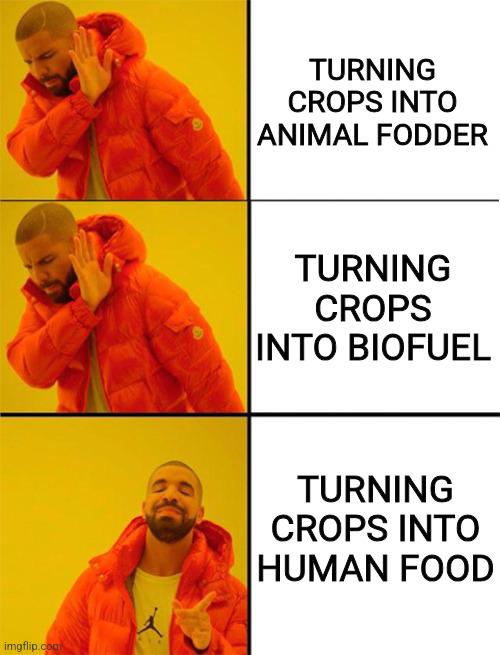this post was submitted on 24 Jul 2024
255 points (90.2% liked)
memes
10280 readers
2508 users here now
Community rules
1. Be civil
No trolling, bigotry or other insulting / annoying behaviour
2. No politics
This is non-politics community. For political memes please go to !politicalmemes@lemmy.world
3. No recent reposts
Check for reposts when posting a meme, you can only repost after 1 month
4. No bots
No bots without the express approval of the mods or the admins
5. No Spam/Ads
No advertisements or spam. This is an instance rule and the only way to live.
Sister communities
- !tenforward@lemmy.world : Star Trek memes, chat and shitposts
- !lemmyshitpost@lemmy.world : Lemmy Shitposts, anything and everything goes.
- !linuxmemes@lemmy.world : Linux themed memes
- !comicstrips@lemmy.world : for those who love comic stories.
founded 1 year ago
MODERATORS
you are viewing a single comment's thread
view the rest of the comments
view the rest of the comments

If we switched to a 100% plant based diet, there would be a strict decrease in the amount of available food. Animals eat things besides food that could have gone to humans. Land that could be used for growing crops is rarely used for raising livestock.
Straight out not the case. lots of animals are on farmable land. Also animals eat lots of our crops eg 80% of the worlds soy. Here's one (of many possible ones) reference stating that we would only need 25% of the current agricultural land if the world went vegan. https://www.economist.com/graphic-detail/2022/01/28/if-everyone-were-vegan-only-a-quarter-of-current-farmland-would-be-needed
the vast majority of the soy eaten by animals is the waste product from soybean oil production. that's a conservation of resources, and it's a good thing.
do you have a reference for this?
https://ourworldindata.org/images/published/Global-soy-production-to-end-use.png
So your data set shows 76% used for animals and 4% for industry. That's very similar to the figures I referred to.
you can see that the vast majority of the uses are from soy meal or soy cake. that's the industrial waste from making soybean oil. exactly as I said.
your economist article obviously relies on poore-nemecek 2018, which is a paper i wouldn't trust to tell me the CO2E of CO2
There's lots of other sources. do you have a counter source?
no. I'm attacking the methodology of poore-nemecek